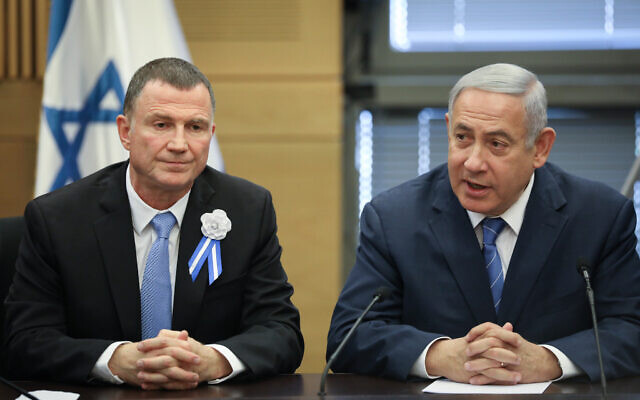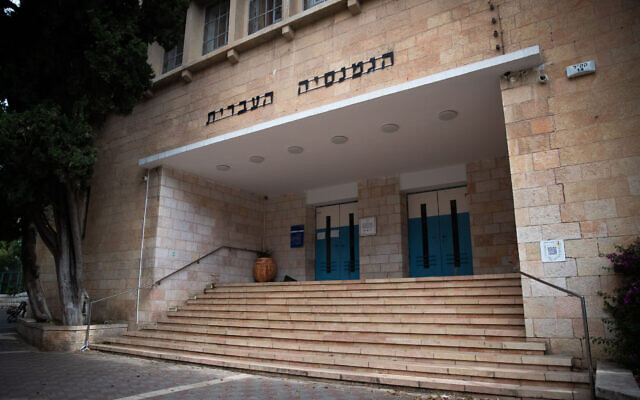Edelstein says closure could come ‘much faster than people think’; Netanyahu says policy change to be weighed, but economy must stay ‘open’

Newly appointed Health Minister Yuli Edelstein warned Sunday of a possible new lockdown, saying the rate of positive results out of all daily coronavirus tests was now five times higher than several days ago.
There has been a sharp increase in confirmed new virus cases in recent days, centered around schools nationwide and notably in Jerusalem’s Gymnasia Rehavia, where more than 100 students and teachers tested positive, causing the high school and others to close temporarily.
At a cabinet meeting in Jerusalem, Edelstein noted the spike, adding that “either it all turns out to be okay, or we will be back under lockdown, and much faster than people think.”
“I hear people asking, ‘What is the panic about? This is just an isolated incident and it has nothing to do with me,’” he said. “I also hear voices asking what does a 40-person increase matter in a country of nine million. But even if you disregard the number of sick in the Gymnasia school, we see there is an increase.”
Edelstein said that while a week ago the rate of positive results from COVID-19 tests was about 0.5 percent, that figure jumped to 2.5% on Saturday, with 28 infections confirmed out of 1,012 tests.
Stressing that Israel has the capacity to test 15,000 people per day, he called on anyone who had symptoms to get tested: “If the public cooperates, we will know what the real numbers are among the population.”

Prime Minister Benjamin Netanyahu also spoke, and said that in light of the possible increase, “we will weigh the steps and if needed we will change our policy accordingly.”
Netanyahu stressed, however, that the economy “has to remain open.”
The premier said Saturday that it was too early to tell whether the upward trend in infections would warrant the reimposition of lockdowns.
Israel has had some important successes in fighting the global pandemic, Netanyahu said during a televised statement, but the crisis “is not behind us.”
“We put out the flames of the coronavirus but there are still embers, and any light wind could reignite these flames,” the prime minister said.
Condemning what he termed a “loosening” of adherence to social-distance rules, he said the coming days would be a “test” to see whether restrictions need to be put back in place.
“As long as no vaccine is found for the virus it will return and spread if we aren’t meticulous about the rules,” Netanyahu said. “If we don’t do this, there will be no choice but to resume limitations on the economy and public sphere.”

The surge in new coronavirus cases was largely centered on the Gymnasia Rehavia, where a “super-spreader” infected some 80 people. All the students and staff are in the process of being tested.
The school and at least 16 others were expected to be shut temporarily as the cabinet convened on Saturday to discuss potential closures to stem the spread. The ministers decided against a suspension of the education system as a whole, opting to close schools only where infections have been recorded.
Six more Israeli schools identified coronavirus cases among students Saturday night and Sunday, and another one had a suspected case, sending many pupils into quarantine.
Channel 12 said schools in Jerusalem, Holon and Kiryat Yearim had all isolated classes after students were found to be carriers.
One student and one teacher were diagnosed at Jerusalem’s Hartman High School, causing the school to close until the end of the week and resume online studying. The teacher also teaches at the Gymnasia Rehavia, the epicenter of the new outbreak. The seventh-grade student likely caught the virus from a Gymnasia student during a basketball class.
An 11th-grade girl at the Jerusalem High School for the Arts was diagnosed with the virus on Sunday, along with a fifth-grader at the Zalman Aran school in the capital. An eight-grade girl at the Masorti High School in Jerusalem also contracted COVID-19, according to Channel 12.
One seventh-grade student was diagnosed at Katzir High School in Holon, sending four classes and six teachers into isolation.
Eight cases were found at a high school yeshiva in Kiryat Yearim, sending students into quarantine.
In Kiryat Yearim, one-third of the students tested for COVID-19 were found to be infected. Not all students have been tested, raising suspicion that the scale of the outbreak there hasn’t been fully discovered.
Another school, Makif Gimel in Beersheba, decided to send teachers and all its seventh-graders, 150 students, into isolation after one student, whose mother caught the virus several days ago, started displaying symptoms.

Despite the sharp increase in recent days in coronavirus infection rates focused on education institutions, cabinet ministers decided against a sweeping closure of schools during an overnight meeting.
Israel had 1,917 active cases as of Saturday night, with a majority under medical care at home and just 116 in hospitals. Of those cases, 36 were in serious condition with 34 requiring mechanical ventilation. In Israel, 284 people have died of the virus since the outbreak reached the country earlier this year.
Health officials are concerned that fewer people are getting tested. While at the height of the pandemic around 13,000-14,000 people were being tested every day, those numbers have dropped considerably in recent weeks as fewer people experience symptoms.
As reported by The Times of Israel
